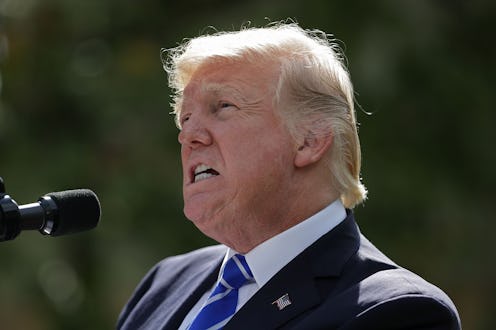News
Trump's Tax Plan Neglects The Poor & Gives Big Breaks To The Rich

With the Republican effort to repeal and replace the Affordable Care Act dead (for now), the White House is apparently turning its attention to what President Donald Trump has said was always his primary focus: tax reform, or to be more specific, tax cuts. And given the GOP's longstanding views on taxation, as demonstrated vividly during the Bush administration, it probably won't surprise you what his plan entails. Trump's big tax plan raises rates for the poor, and cuts rates for the rich.
According to an Axios report on the plan, Trump will be able to argue, with some factual accuracy, that the plan constitutes a tax cut for the lower class thanks to an increase in the standard tax deduction, nearly doubling it to $12,00 for an individual and $24,000 for a married couple. The actual tax rate for the lowest bracket, however, would indeed go up, reportedly rising from 10 percent to 12 percent.
The top tax rate, however, would reportedly be cut from 39.6 percent to 35 percent. This would fulfill what's more or less been the GOP's guiding light on taxation for decades: giving corporations and the upper-class more of their money. During the Bush administration, the Republican Party similarly passed sweeping tax cuts which overwhelmingly benefited the rich, as well as cut corporate tax rates.
Tax reform is a politically loaded issue for Trump, given that he was ostensibly elected on the back of his populist tone. According to Axios, Trump was concerned that raising the rates on the lowest tax bracket would be politically dangerous, but his concerns were eased by the increased deductions.
To whatever extent he'll be involved in publicly championing the GOP tax plan ― he didn't do very much of this for the GOP health care push, and showed very little functional policy knowledge when he did ― he'll be doing so from a uniquely compromised personal position.
That's because Trump never released his own tax returns as a candidate, breaking with decades of precedent. Throughout the campaign, he insisted he couldn't release his returns because they were "under audit," but said he would release them once the audit ― which he never provided any evidence was actually happening ― was complete.
After the election was over, however, many of his surrogates quickly changed their tune, claiming that he would not and did not need to release the returns because he'd already won. In short, you could be forgiven for suspecting some duplicity in all this.
As the Washington Post pointed out, the polling numbers on Trump's tax plan are not great, if his hope is to convince people it's some sort of populist boon to working people. A full seven out of 10 Americans reportedly believe the American tax system favors the rich, and 51 percent of Americans believe Trump's tax plan will mainly benefit the upper-class ― in other words, that it'll further bolster a system that's already skewed in favor of the wealthy and powerful.
Just as was the case with the health care repeal efforts, the Republicans have a pretty comfortable margin of error in the House ― they control 46 more seats than the Democrats, and are able to lose as many as 22 GOP votes while still passing a bill ― but the Senate is another matter. Senate Republicans hold the majority by a mere two seats, 52-48, meaning they can only lose three seats and still be able to send a bill to the president's desk (in the event of a 50-50 vote, Vice President Mike Pence casts the tiebreaker).
As such, the battle over tax reform could be as fraught and challenging as the health care push was, with everyone scraping for the support of the Senate's most moderate Republicans.